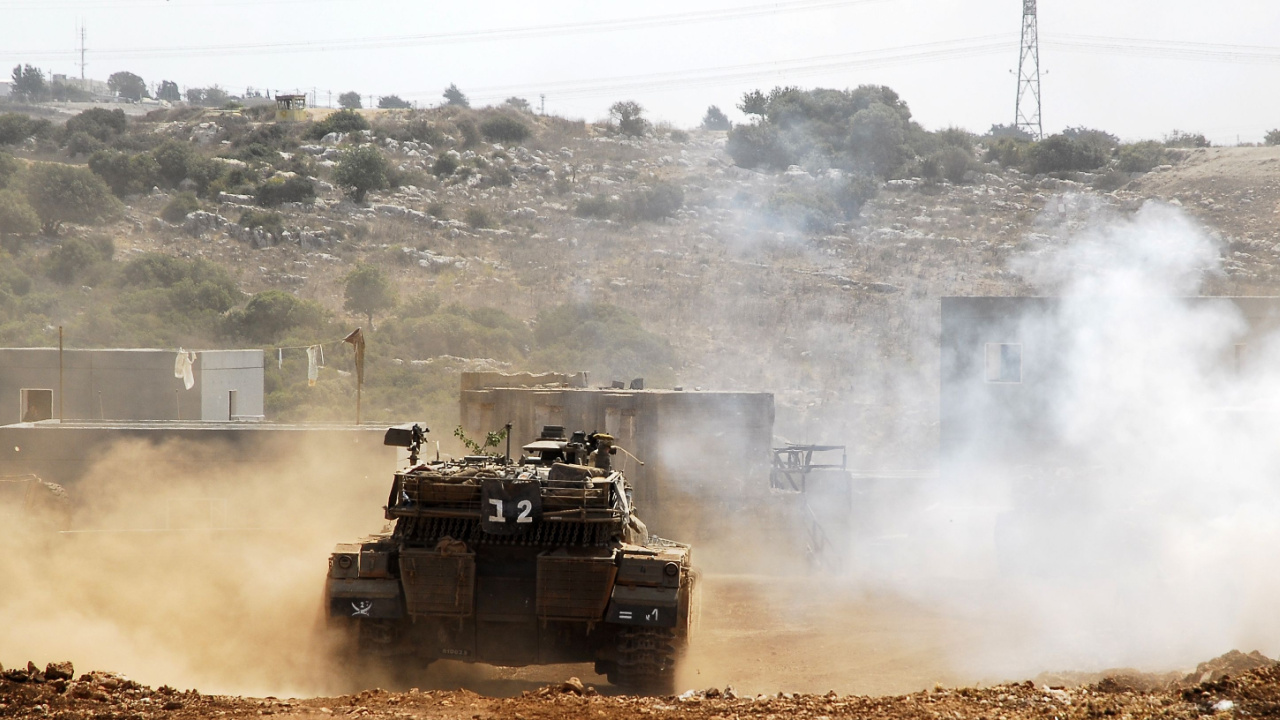A war between Israel and Hezbollah would engulf the Middle East

After nine months of brutal fighting in Gaza, Israel and Lebanon’s Hezbollah appear ready to escalate ongoing hostilities into a larger war. Indeed, both sides are rattling their sabers as Israel wraps up heavy operations in Gaza to shift focus to the Lebanon front, with Israel particularly intent on ensuring a lasting defeat of its northern enemy. This reality should terrify world leaders, who risk mass displacement on the scale of the 2015-16 refugee crisis. They must publicly reject any potential conflict.
Lebanon and Hezbollah have been engaged in cross-border firefights since October 8, a day after Hamas attacked Israel. Both sides have since escalated their heated rhetoric and actions, expanded the scope and scale of their military operations, increasingly targeted key figures and locations, and threatened a wider bloody war. Crucially, the situation appears to fall outside the normal deterrence structure established after the 2006 war between the two sides.
Israeli politicians are not holding back on public statements. Israeli Defense Minister Yoav Gallant repeated earlier threats that his country would send Lebanon “back to the Stone Age” on June 27. These and similar statements by Prime Minister Benjamin Netanyahu underscore Israel’s willingness to invade Lebanon.
Hezbollah’s rhetoric is no different, although it and its sponsor Iran appear less inclined to start a full-blown war. Still, Hezbollah leader Hassan Nasrallah claimed on June 26 that there would be “no rules and no red lines” in a future fight. Earlier, the group released drone footage from Israeli airspace underscoring the group’s ability to attack critical infrastructure – a clear signal that it will wreak havoc in Lebanon from within Israel.
President Joe Biden dispatched senior officials to Lebanon and Israel to dissuade the parties from a full-scale war, but those efforts are stalling. Hezbollah remains adamant that any cessation of fighting is contingent on a permanent ceasefire in Gaza – something Netanyahu continues to undermine by being tight-lipped about negotiations. Similarly, U.S. officials are now doing the same with Hezbollah, with anonymous officials assuring that the United States will defend Israel in the event of war.
So the situation is precarious. The greatest threat to Israel is Hezbollah – a fact that the leaders of both groups understand only too well. Hezbollah must project strength and support for Palestine within its broader resistance ideology to maintain legitimacy among its support base. This ideology – for better or worse – drives its thinking, meaning it cannot retreat in the fight with the Israelis. The United States, for its part, claims to support de-escalation, but continues to force itself into an escalatory posture through its unconditional support of Israel.
In this scenario, all roads lead to conflict. Israel will most likely use force to facilitate the return of some 96,000 citizens to its northern cities. This is to say nothing of influential Israelis who, after two previous embarrassing defeats in Lebanon, still believe that their country can and should defeat Hezbollah. Even on a flowery interpretation of the situation, in which Israel is trying to bring about a relatively informal ceasefire in Gaza by halting all major operations after its invasion of Rafah to signal to Hezbollah that it offers a way out of the abyss, the chances of success of such a strategy are slim. Neither party is likely to be able to confine the fighting to the border areas, however much some have suggested “limited” Israeli operations.
In fact, that’s because an inevitable spiral of escalation may already be in place. Israel will not commit to a full, permanent ceasefire in Gaza, and Hamas is unlikely to budge on its demands—namely, a full Israeli withdrawal and a permanent ceasefire. Without an agreement, Hezbollah is unlikely to seek a unilateral ceasefire with Israel. Despite all U.S. efforts to achieve positive, peaceful outcomes, the Biden administration has proven incapable of doing what is necessary to achieve an outcome that ends the fighting—largely because of Biden’s apparent belief that Washington must meet every Israeli demand.
The result is a war between Hezbollah and Israel — one that the United States will almost certainly be drawn into as well. Israeli Prime Minister Benjamin Netanyahu is a master of U.S. politics and regularly manipulates Washington to support his ambitions. When the bombs fall on Tel Aviv — and they will fall in large numbers, as Hezbollah’s 150,000-strong missile arsenal overruns Israel’s defenses — he will likely choose to publicly embarrass Biden again. That argument will cover familiar rhetorical bases: Biden is not doing enough to support his friend, ally and only democratic partner in the Middle East.
The US political elite will swallow this and force Biden to support the Israelis by directly involving the United States in the war. Rest assured – this will not be the moment when Washington says no to Israel, having blindly supported Tel Aviv up to this point. And if US jets start bombing the Bekaa Valley, the risk of a broader regional war will rise significantly, putting American troops maintaining poorly defended, remote locations in Syria, Iraq and Jordan at high risk of Iranian or proxy militia attacks.
In this scenario, further regional problems will emerge. The displacement of populations will have cross-regional consequences, exacerbating existing crises in Iraq, Syria and Lebanon. This will ultimately force an undetermined number of people to flee to Europe or other countries in the region already facing stability problems – including Jordan. Such an outcome would be comparable to or even surpass the migration crisis of 2015-16 and would pose a major problem for Europe in the face of the war in Ukraine and the growing far-right.
Resources and attention would have to be shifted to addressing these problems, which would distract from the unified but fragile support for Ukraine. Worse, it would distract the US from its much-needed strategic focus on the Pacific and East Asia, where China would surely be happy to see a deadlocked Washington. This is without even mentioning the negative impact a war in Lebanon would have on US priorities across the Middle East, not just efforts to integrate the region politically, economically and defensively. Finally, a broader destabilization of the system, which is reaching its limits, would make most ongoing humanitarian crises even worse—an unacceptable outcome given the lack of funding for even the worst global conflicts in Gaza, Syria, Yemen, Ethiopia and Sudan.
Ultimately, the risks of war between Israel and Hezbollah represent a doomsday scenario for American policymakers, but one that they can and should avoid. It must be made clear now that the United States will not support an Israeli invasion of Lebanon. Anything other than that approach makes Washington an accomplice in a firestorm of its own making.
Alexander Langlois is a foreign policy analyst focusing on the Middle East and North Africa. Follow him on X: @langloisajl.
Image: Ran Zisovitch / Shutterstock.com.



